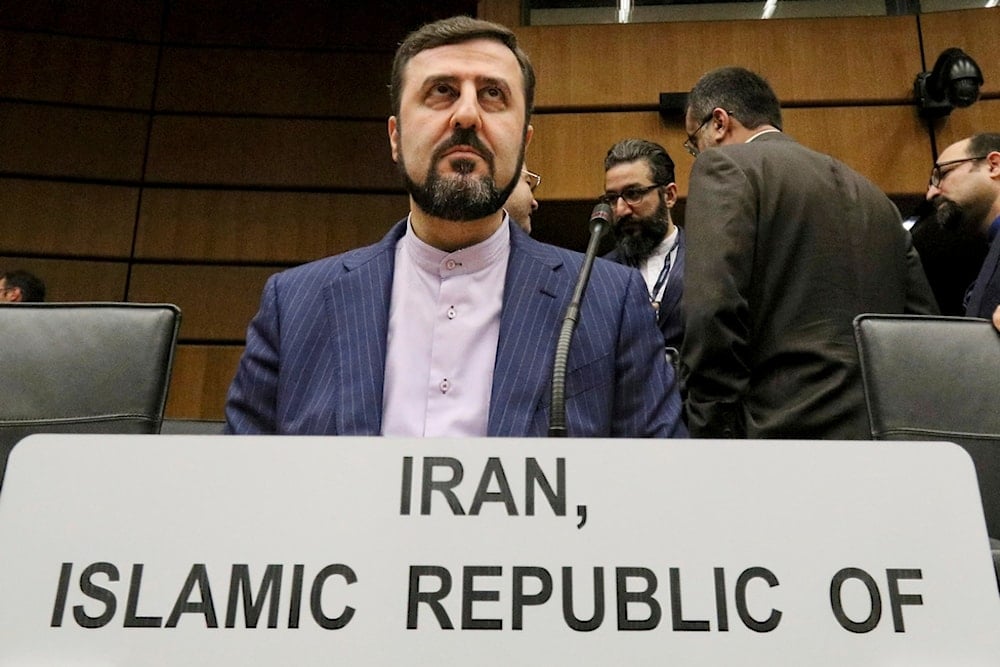Iran pushes diplomacy as Europe threatens sanctions snapback
Iran and European powers held talks in Geneva to prevent a sanctions snapback under the 2015 nuclear deal, with Tehran urging diplomacy and rejecting EU threats.
-

Iran's Ambassador to the International Atomic Energy Agency, IAEA, Kazem Gharibabadi, waits for the start of the IAEA board of governors meeting at the International Center in Vienna, Austria, November 21, 2019. (AP)
Iran held talks on Tuesday with European powers in Geneva in a bid to prevent the reimposition of sweeping UN sanctions threatened under the 2015 nuclear deal.
Kazem Gharibabadi, Iran’s deputy foreign minister, who participated in the meeting with diplomats from the United Kingdom, France, and Germany, wrote on X that it was “high time” for the E3 “to make the right choice and give diplomacy time and space.”
Foreign Ministry spokesperson Esmaeil Baghaei confirmed that both sides agreed to continue contacts in the coming days. The three European states, all parties to the original nuclear accord, have threatened to trigger the deal’s “snapback mechanism” by the end of August.
Tuesday’s meeting marked the second round of talks between Iran and European officials since the end of the 12-day war with the Israeli occupation in June, sparked by an unprecedented surprise attack. That conflict derailed Tehran’s nuclear negotiations with the United States and led Iran to suspend cooperation with the UN’s nuclear watchdog.
Snapback used as a psyop
Ahead of the talks, Baghaei argued that the Europeans had “no legal or moral” grounds to activate the snapback clause. “We will not allow this issue to become a tool of psychological warfare,” he said, stressing that Iran’s focus remained on preventing “costly” actions or incidents.
Under the snapback provision, the UN sanctions lifted in 2015 would automatically be reimposed unless Iran agreed to curb uranium enrichment and restore cooperation with International Atomic Energy Agency inspectors.
The window for activating the mechanism closes in October, after which the sanctions would be permanently lifted. According to the Financial Times, the Europeans have suggested extending the deadline, but Tehran has rejected that option. Foreign Minister Abbas Araghchi recently said Iran was working closely with China and Russia to block any reimposition of sanctions.
The 2015 nuclear deal began to unravel in 2018 when then-US President Donald Trump unilaterally withdrew from the agreement and reimposed harsh sanctions. Just prior to the June war, Iran had held five rounds of talks with Washington aimed at reaching a new agreement on its nuclear program.
JCPOA and IAEA tensions
Tehran has disputed the legality of invoking the snapback clause, accusing European states of failing to uphold their own obligations under the JCPOA.
Iran suspended cooperation with the IAEA earlier this year following a 12-day war with "Israel," arguing that the UN nuclear watchdog did not condemn Israeli and US strikes on its nuclear facilities.
Russia's Foreign Affairs Ministry published on its official Telegram channel on Monday a brief on the phone call between Russia's Foreign Minister Sergey Lavrov and his Iranian counterpart, Abbas Araghchi.
Per the statement, Araghchi briefed Lavrov on the outcomes of his recent discussion with the E3 nations concerning the issues around Iran's nuclear program.
"The Russian Side reaffirmed its commitment to continued significant diplomatic efforts aimed at normalising the situation around the JCPOA and de-escalating tensions in the Middle East," the foreign ministry's post read. "The discussion also covered priority items on the bilateral agenda. These included the implementation of the Treaty on Comprehensive Strategic Partnership between Russia and Iran, signed by the presidents on January 17, 2025, and the agreements reached on expanding cooperation in the transport and energy sectors."
Read more: E3 has no right to trigger snapback mechanism against Iran: Araghchi

 4 Min Read
4 Min Read










